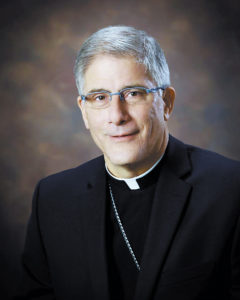
Bishop Joseph R. Kopacz
By Bishop Joseph Kopacz
From Pope Francis, with love, to Grapevine, Texas to an estimated 3,500 Catholic Leaders from throughout the United States. The Holy Father encouraged those gathered for the V Encuentro national gathering to “tear down walls and build bridges.” “Through this V Encuentro process, you can promote a culture of encounter,” Pope Francis said. “It is a concrete way to move beyond our comfort zones and look for those who need hope in their lives, especially young people and those who are on the peripheries.”
The U.S. bishops initiated the Encuentro, which means “Encounter,” to better serve the growing Latin American community. The process will continue through 2020. “For the pope, missionary discipleship begins with an encounter with Christ,” Archbishop Christophe Pierre, apostolic nuncio to the United States, said in his bilingual remarks. “We have come together to encounter the Christ that gives meaning to our lives. Once we have encountered him, we will share him with those we encounter.”
Amid the celebration, Archbishop García-Siller of San Antonio acknowledged the sexual abuse scandal brought to light by the Pennsylvania grand jury report and revelations about Archbishop Theodore McCarrick. “You are right to be broken-hearted by the faults of your shepherds,” he said. “Let us pray to God for the victims of the crimes of this crisis. Do all you can for the victims. Pray also for the perpetrators and for us your bishops.”
Then he brought the light and hope of the Gospel to the moment. “The Holy Spirit comes to wake us up and inflame our hearts with a renewed love for God,” he said. “We must not be afraid. The Lord will be present with us. He is the crucified one, but he is the risen one, too.”
Sister of Mercy Ana María Pineda, an associate professor at Santa Clara University and a founding member of the Hispanic Theological Initiative, shared a reflection on the history of the Encuentro project, which began in 1972. Subsequent Encuentros in 1977 and 1985 helped the church better discern its changing demographics. The fourth Encuentro or Encuentro 2000, celebrated the contributions of the many cultures that make up the U.S. Church. “Once again God remembers us,” Sister Pineda said of the V Encuentro. “Today we once again claim who we are.”
“Who we are,” so to speak, is a far different reality from 46 years ago at the time of the first Encuentro.
The Latino community has grown and evolved over two additional generations through birth and immigration to nearly 40 percent of the Catholic Church in the United States. The focus of the V Encuentro is the recognition that Latinos are called to assume greater leadership in the Church. As the demographics of the Catholic Church in recent decades has shifted from the Northeast and the Midwest to the South and the West, so too have the descendants of European immigrants yielded to immigration from Central and Latin America, Asia, Africa and the Islands of the Caribbean.
Since the conclusion of the Second Vatican Council in 1965 the laity by virtue of the universal call to holiness in Baptism and their vocation to exercise ministry in the Body of Christ, has embraced the mission and ministries of the Church that were once the nearly exclusive domain of the ordained and religious. The burgeoning presence of Latino Catholics and Asian Catholics at this moment in the Church of the United States will inevitably transform the complexion of leadership going forward. The V Encuentro is about making this transformation more intentional.
In spite of the shadows that obscure the Church’s mission and vision, The Encuentro was marked by widespread joy, considerable animo (spirit), enthusiastic love for the Lord and the Blessed Mother and hope for the future (sigue adelante). Morning and evening prayer and especially the Mass, were celebrated with reverence in the fire of the Holy Spirit. Our delegates from the Diocese of Jackson were fully engaged in all of the proceedings and many on the home front were present in prayer and spirit. Our commitment to and our collaboration with the Hispanic ministry throughout our Diocese is remarkable.
This is not just my humble opinion. This year Catholic Extension has selected our Hispanic ministry as one of their four finalists for the Lumen Christi award which is bestowed annually to a recipient in a mission ds iocese for exemplary work in service of the Gospel. With Saint Paul in his letter to the Philippians, we can rejoice in the Lord, always and may the Lord who has begun the good work in us bring it to fulfillment on the day of Christ Jesus.
